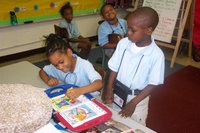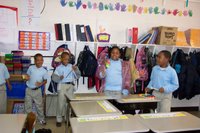Today I got back an afternoon planning time. It is fantastic. In addition to my twice-weekly 10:00-10:30 planning time, I now have a DAILY 1:00-1:30 planning time. What this means is that my children go to Library, where they get to look at books or watch an educational video. What it really means is that even when I get frustrated with them during math, I get half an hour to simmer down and be cheerful again for Science/Social Studies/dismissal. Honestly, it makes me a MUCH better teacher. Also, I use it for remediation.
Today I pulled J--, M--, and E--, who didn't understand subtraction and have been failing their Mad Math Minutes (well, they would be failing if it was graded.) In a group of three, with no distractions, we did a lesson on subtraction, and all of them understood. Well, M-- and E-- really got it, and J-- got it when he bothered to think about it (very hyperactive). E-- looked up at me, after solving 6 problems using blocks and said, "Mi' Hay,' I know how to do my Mad Math Minute now!" After the lesson was done (about 20 problems, I think) I let them fix their Mad Math Minutes until the rest of the class came back.
M-- rides the bus to Shelby after school, where she waits for her mom in the office. She sometimes sees my roommate Southern Girl. Southern Girl told me that M-- was really excited today because she got "subtracted."
R-- and J-- have both been tryingt o behave more. J-- still loses all motivation as soon as he flips his card once, but I just can't let blatant talking when I'm talking continue. R-- usually understands when he needs to flip his card, and sitting apart from the others has done wonders for his behavior. However, if he goes past one flip, he gets really angry. I have not had him make it to orange yet this week though, which is fantastic.
This weekend GSD roommate and I are going to a teacher conference in Little Rock. It's a Fred Jones training. Fred Jones is a fantastic motivator and behavior controller. He wrote a book called "Tools for Teaching" that is a must-have for anyone who is doing TFA (probably any first year teacher, but especially the untrained ones.) I'm glad to get away even though I just got back. I feel like I need a little bit more of a break than Thanksgiving from my typical Clarksdale-TFA-Delta lifestyle. I also didn't get any "going out" while I was home, so I'm still hankering for some music, some drinks, some people.
Next week in school is a review week because the week after that is nine-week testing. I feel some residual pressure from TFA Institute Training to press on with instruction, not waste the time reviewing, etc. etc. But I disagree. I saw things gel for my students last nine weeks during this review week. We look at all of our sounds, all of our words, all of our reading strategies, and we really put them together. We look at all of our adding and subtracting, fact families and word problems, hundreds board, patterns, graphing and predicting, and we put THEM together. We get the bigger pictures in Science and Social Studies -- ALL weather, ALL seasons, continents and landforms. Fire drills, citizenship, school rules. It will be a good week. I'm going to make it as interactive as possible. As hands-on as possible. We're going to move UP Blooms. We've hopefully gotten from knowledge through comprhension to application in class, with a smattering of analysis. This next week, we are going to analyze, synthesis, and then evaluate, baby -- pick which strategies work best for us in reading and math, and get ready to employ our arsenals on the nine-weeks tests. Woo hoo.
 D-- "reads" with a LeapPad as K-- looks on and E-- and R-- (yes, that R--) listen to a tape.
D-- "reads" with a LeapPad as K-- looks on and E-- and R-- (yes, that R--) listen to a tape.



